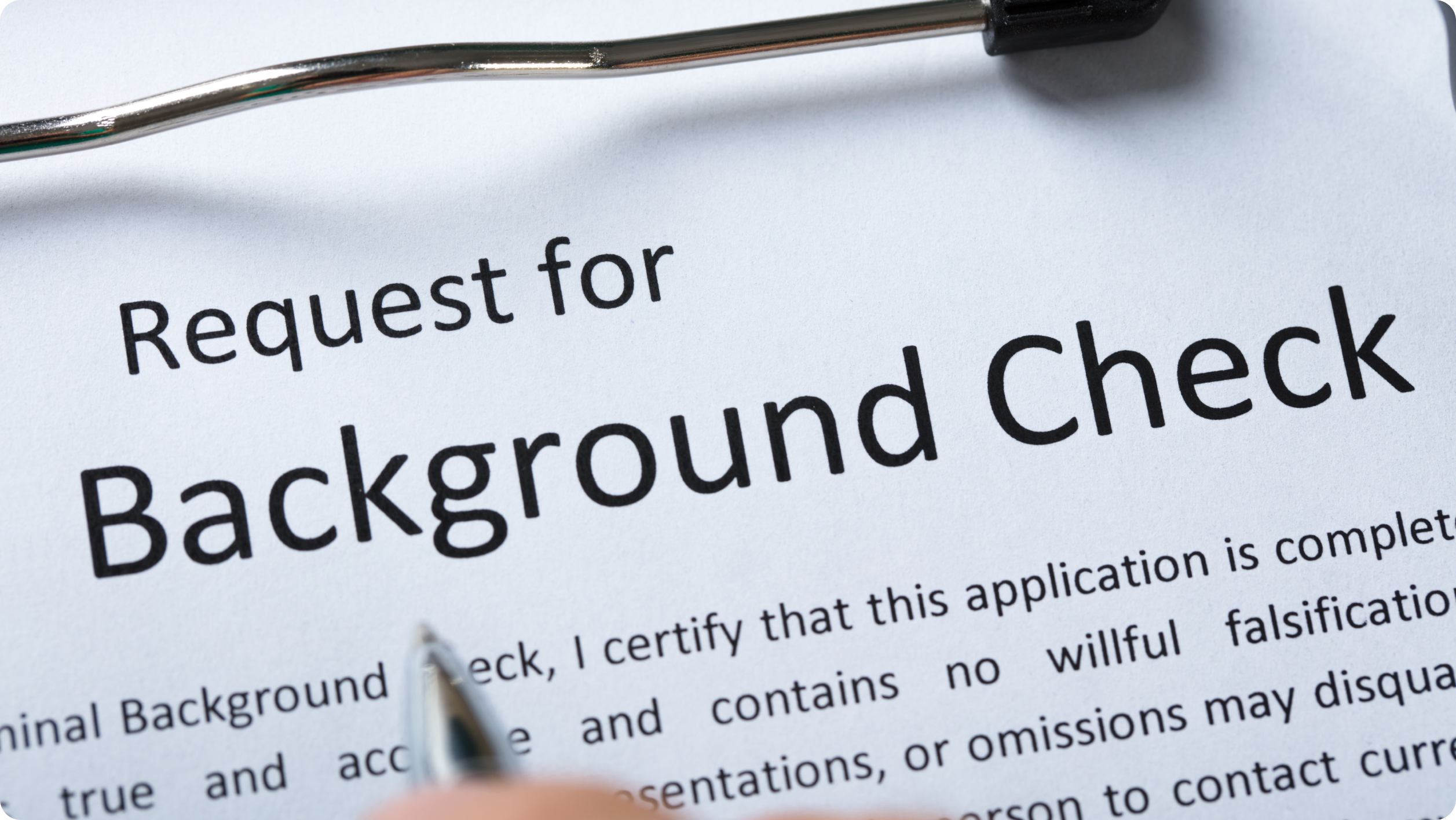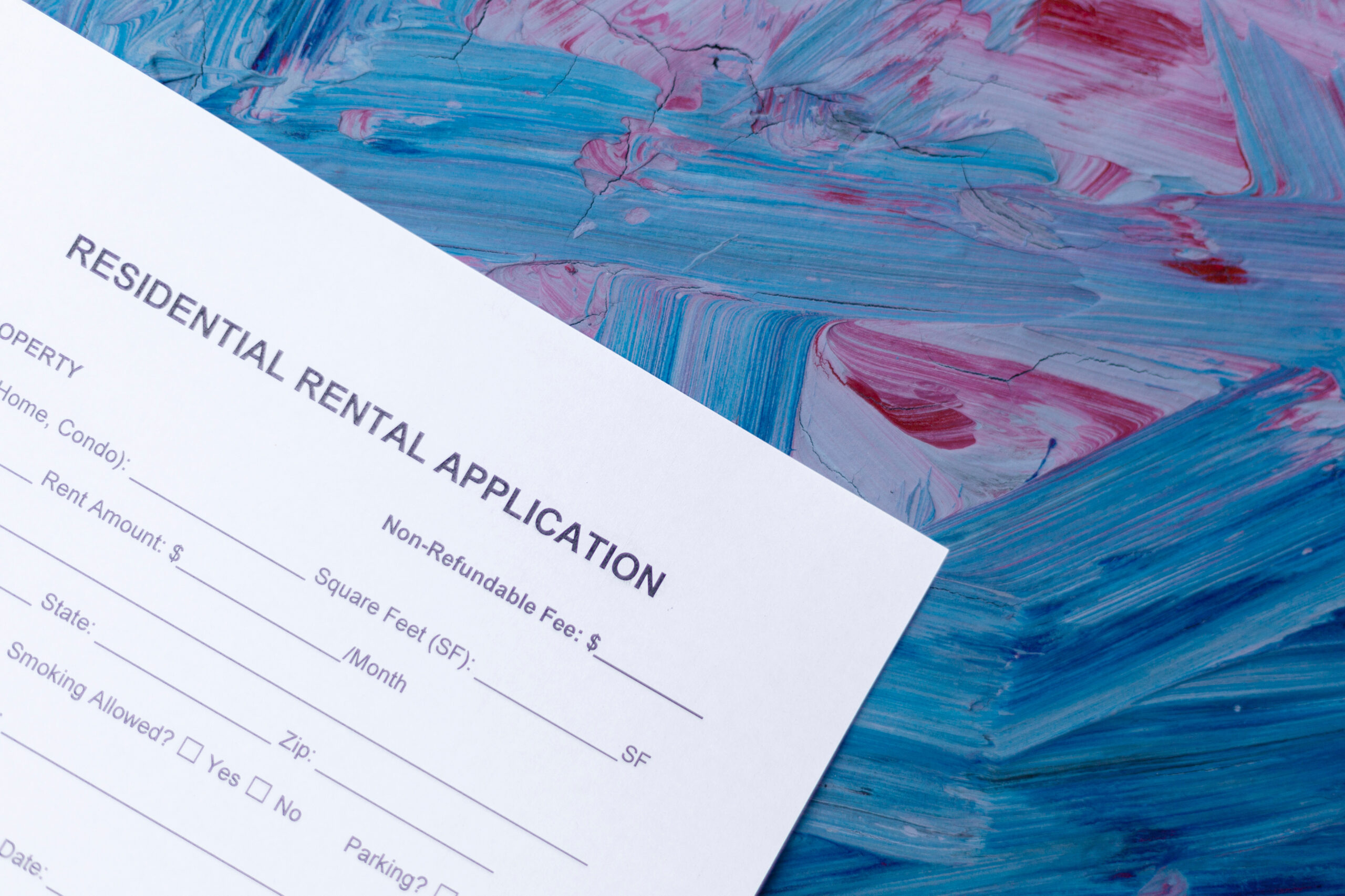Think you can spot risky renters just by looking at a rental application? In the U.S., 80% of landlords have received fraudulent applications in the past 12 months, leading to an average of nearly $4.2 million in bad debt.
The best way to avoid this is by taking precautionary steps, like running a thorough background check on every tenant before signing a lease.
Let’s explore what’s included in a rental background check and how it helps you choose the right tenant every time.
Key takeaways:
- Rental background checks cover criminal history, credit habits, rental behavior, eviction records, and income stability. These details help landlords assess tenant reliability and financial stability.
- Rental history includes past addresses, payment behavior, and landlord references, helping landlords identify reliable tenants and flag any past disputes.
- Background checks must comply with state laws, which vary regarding what can be included and the criteria for denying tenants. For example, some states limit how far back criminal or credit history can go.
- Renter background checks can take 1 to 5 business days, depending on the service, what’s included, and how quickly tenants provide authorization.
- Traditional checks are manual and expensive, often taking weeks. Digital tools like Baselane simplify the process, offering fast, all-in-one background checks that include credit, criminal, evictions, rental history, and income reports.
What is a rental background check?
A rental background check for housing (or tenant evaluation background check) is a detailed screening process landlords use to evaluate if a tenant is a good fit for a rental property. It provides insights into a tenant’s credit, rental, eviction, and criminal history to identify potential risks.
What does a background check show for renting?
A background check shows whether a tenant is financially responsible, follows lease terms, and ensures property safety.
- Payment patterns and debts: Shows if tenants pay bills on time, have outstanding debts, or overuse credit. For instance, a tenant with a history of late credit card payments may also struggle with rent payments.
- Legal history: Highlights any past convictions or pending charges. For example, a recent conviction for property damage could signal risks to your rental.
- Rental issues or evictions: Identifies past disputes with landlords, unpaid rent, or eviction records. A tenant with multiple evictions over non-payment may not be a reliable choice.
- Reliability with lease obligations: Indicates whether tenants honor lease terms, such as timely rent and proper property care. For instance, a tenant with strong references from past landlords is more likely to respect your property.
Do you need a renter background check?
A background check isn’t legally required but can help landlords avoid unnecessary risks.
Skipping a background check means you could end up with a tenant who stops paying rent halfway through the lease or leaves your property damaged. Conducting a renter background check helps you find reliable tenants, giving you peace of mind and protecting you from potential financial and legal troubles.
Here’s why you should do renter background checks:
- Reduce financial risks: Spot red flags like unpaid credit card bills or previous bankruptcies. For example, if a tenant’s credit report shows frequent late payments, it might indicate challenges in paying rent consistently.
- Ensure property safety: Criminal records help you identify tenants with histories of theft, vandalism, or violent offenses. For instance, a tenant with a recent conviction for property damage might not be the best fit for a new lease.
- Verify reliability: Assessing rental history provides clarity on whether the tenant respects lease terms. For example, if a previous landlord mentions late rent payments or unresolved disputes, it could signal future issues.
- Streamline the process: Tools like Baselane’s tenant screening service make it easy to collect applicant information for credit, criminal, eviction, and rental history reports in one place, reducing the manual effort of verifying multiple documents.
- Maintain legal compliance: Following Fair Housing Laws protects you from discrimination claims. For instance, a clear screening policy applied equally to all applicants can prevent legal issues while ensuring you select trustworthy tenants.
What does a rental background check consist of?
| Report | What it shows | Why it matters | Tips |
|---|---|---|---|
| Criminal report | Felonies, misdemeanors, pending charges, sex offender status. | Ensures property and tenant safety. | Get written consent; focus on relevant convictions. |
| Credit report | Credit score, payment history, debts, bankruptcies. | Indicates financial reliability and rent payment ability. | Look beyond score; assess payment trends. |
| Eviction report | Past evictions, court judgments, lease violations. | Flags poor rental behavior or financial issues. | Ask for context before disqualifying applicants. |
| Rental history | Previous addresses, payment history, lease terms, reasons for leaving. | Predicts property care and lease compliance. | Independently verify references. |
| Income & employment verification | Pay stubs, bank statements, W2s. | Ensures tenants can afford rent. | Use the “3x rent rule” for affordability. |
A rental background check provides key insights into who an applicant is, how they manage their finances, and their rental history. These checks typically include three main reports: credit, criminal, and eviction history report. With Baselane, you’ll also receive income and employment verification and rental history.
1. Criminal background check
A criminal background check helps you identify issues that could impact other tenants or your property.
What’s included in a criminal background check?
- National and state criminal records: Searches for felonies, misdemeanors, or pending charges.
- Sex offender registry: Confirms the applicant is not listed on the registry.
- Criminal convictions vs. arrests: Focuses on convictions, as arrests don’t always lead to charges.
How to interpret criminal records
- Minor offenses: Traffic violations or minor infractions may not disqualify an applicant.
- Major offenses: Crimes like violence, fraud, or drug trafficking should be reviewed carefully.
Why it matters
Checking criminal history helps protect your property, tenants, and peace of mind. It also ensures compliance with Fair Housing laws.
Tip: Always get written consent from the tenant before conducting a criminal background check. Focus only on offenses relevant to tenancy.
For example, a recent conviction for property damage or theft might raise concerns, while a minor traffic violation may not impact their ability to be a reliable tenant.
2. Credit report
A credit report shows how tenants manage their money and pay bills.
One common question landlords encounter is, does eviction affect credit? Eviction records don’t show up on the report, but can impact credit scores if reported as debt in collections.
What’s covered in a credit report?
Credit reports aren’t all the same. Some only give partial credit history, while others have a complete credit profile (Baselane provides a full Equifax report), including:
- Credit score: A number (ranging from 300 to 850) that reflects a tenant’s financial health and reliability.
- Outstanding debt: Shows payment history and balances across credit accounts, loans, and other obligations.
- Delinquent accounts: Past due accounts, bankruptcies, and collections.
- Credit inquiries: Companies or individuals who have requested the tenant’s credit report.
- Consumer information: A tenant’s name, birth date, SSN, address, and contact information. Confirm these details match what’s on the rental application.
Good credit report vs. bad credit report
Tenants with credit scores below 620 are five times more likely to default on rent.
- Good Credit: Scores above 700, consistent on-time payments, and no major derogatory marks.
- Bad Credit: Scores below 600, frequent late payments, and high credit utilization.
Why credit history matters
Reviewing credit reports for rental applicants provides a snapshot of their financial health and ability to meet monthly obligations. For instance, using less than 30% of available credit indicates that a tenant manages debt responsibly and is less likely to struggle with rent payments.
Tip: What do landlords look for in a credit check? Payment history, outstanding debts, and credit utilization are key factors that influence tenant reliability.
3. Eviction records
Eviction records offer insights into a tenant’s rental behavior and reliability, helping you identify potential risks.
What’s included in an eviction record?
- Past evictions: Highlights any past evictions, including dates and court details.
- Judgment amount: The amount owed for unpaid rent, damages, and other costs incurred by the landlord.
- Notice type: Indicates the type of eviction notice given to the tenant (e.g., pay-or-quit, lease termination).
- Plaintiff information: Details about who filed the eviction.
Why it matters
Evictions can cost landlords anywhere from $500 to $10,000. A thorough background check helps avoid renting to bad tenants who may default on payments or damage property.
Let’s take an example:
- Tenant A: No eviction history, strong references, consistent employment.
- Tenant B: Two evictions in five years for non-payment.
The choice is simple—Tenant A poses less risk.
Tip: Don’t dismiss tenants for a single eviction. Ask for context and check additional references.
4. Rental history and references
A rental history check gives landlords a clear picture of prospective tenants’ behavior in previous rentals. It predicts how they might treat your property and follow lease terms.
What’s included in rental history?
- Previous addresses: Where the tenant has lived, for how long, and why they’re moving.
- Rent amount: Monthly rent payment amount. This gives you an idea of what a tenant can afford.
- Landlord details: Contact information for previous landlords.
Why rental history matters
A strong rental history indicates the tenant is reliable, pays on time, and treats the property well.
Questions to ask landlord references
- Did the tenant pay rent on time?
- Were there complaints from neighbors?
- Was the property left in good condition?
Tip: Always verify references independently—some tenants may provide fake contacts. Search listings online or use local property tax records to confirm the landlord’s name and contact details.
5. Employment and income verification
This step ensures tenants can afford the rent and easily manage other financial obligations.
What’s included in income verification?
- Income sources: Tells you how your tenant gets paid (employer, self-employment, investments, etc.).
- Employer details: Includes the employer’s name and job duration (income start and end dates).
- Monthly income: Shows gross and net monthly earnings.
Baselane’s income report also includes pay frequency and forecasted monthly net income, providing insights into future earning potential. Plus, you’ll see a tenant’s debt-to-income ratio (ideally under 35%) to assess their financial stability.
Income threshold
Most landlords use the “3x rent rule” — tenants should earn three times the monthly rent to qualify. When renting to elderly tenants, verify income stability and rental history to ensure they can meet lease terms comfortably.
Why it matters
Stable income lowers the risk of late payments or defaults. For example, a tenant earning $6,000 for a $2,000 rental is a safer bet than one earning $3,500.
Tip: Most screening services rely on self-reported income, which can easily be faked. Baselane verifies income through a tenant’s bank, payroll provider, or documents (pay stubs, bank statements, W2s).
Tenant Screening That Actually Works
Comprehensive reports you can trust, delivered in minutes.
How extensive are background checks for apartments?
The level of detail in a background check depends on the service you use. Some only do basic checks, while others (like Baselane) deliver comprehensive reports, including verified records for income, credit, criminal history, evictions, and identity.
Basic checks
- Cover credit checks and criminal reports.
- These are quick but generally miss key details like eviction records, full credit history, and income insights.
Comprehensive checks
- Include credit history, rental history, criminal records, evictions, and income verification.
- These give you a full picture of tenant reliability and help avoid fraud.
How far back do rental background checks go?
The timeframe varies based on the type of information included in a report and what databases a background check service uses.
Criminal records
Criminal background checks generally go back 7 years but vary by state and the severity of the offense.
- Minor offenses: Misdemeanors are usually reported for up to 7 years.
- Major offenses: Felonies and severe crimes like fraud or violence may appear indefinitely in some states.
- State variations:
- States like California and New York limit most records to 7 years.
- Others allow lifetime reporting for certain felonies.
Credit history
Credit reports typically cover financial activity from the past 7–10 years.
What’s included:
- Active credit accounts receiving on-time payments.
- Closed credit accounts with positive or negative statuses (7–10 years).
- Late payments (up to 7 years).
- Collection accounts (5-7 years).
- Bankruptcies (7-10 years).
Eviction records
Eviction history is typically reported for up to 7 years, depending on the state. In Oregon, it’s 5 years.
What’s included:
- Eviction records (up to 7 years).
- Court-ordered possessions (up to 7 years).
- Monetary judgments (up to 7 years).
How long does a rental background check take?
A tenant rental background check can take a few hours to several days, depending on how quickly tenants fill out the application and provide authorization. How you collect information will also impact the turnaround time. Paper applications and manually verifying details (contacting courts, employers, etc.) generally take longer than online background checks.
What affects processing time?
- Incomplete applications: Missing or incorrect details, like outdated contact info, slow things down.
- Criminal record searches: Some jurisdictions require additional steps for database access. In California, court rulings have restricted access to personal identifiers like dates of birth in public records, leading to significant delays in processing criminal background checks.
- Manual reference checks: Calling previous landlords or employers can take time, especially if they’re unresponsive.
How to speed it up
A lengthy screening process can leave your property vacant longer. Worse, delays might mean losing great tenants to another rental.
Here’s how to speed up the screening process:
- Use digital screening services: Streamline applications and background checks with online tools like Baselane tenant screening.
- Set clear expectations: Let applicants know the screening timeline and any fees upfront.
- Verify income sources: Opt for a screening service with income and employment verification, including fraud detection for uploaded documents.
Tip: Don’t sacrifice thoroughness for speed. A quick but incomplete background check could cost you more in the long run.
Screening methods: traditional vs. digital
When screening tenants, you have a couple of options for background checks. Here’s a quick breakdown to help you make an informed decision:
Traditional background check services
Traditional background checks are usually done by a dedicated company that manually verifies information by contacting employers, landlords, credit bureaus, and courts through phone or mail.
Pros:
- Extensive verification process (typically used for high-security positions)
- Detailed insights not always available through automated checks
- Trusted method with a long history of proven accuracy
Cons:
- It’s expensive — costs can add up quickly
- The process can take several days or weeks
Online screening tools
Digital background checks use online tools to quickly gather tenant information from national and local databases, including credit, criminal, and rental history.
Pros:
- Fast results (within 24 hours)
- Flexible and budget-friendly reporting options
- Online verification and fraud detection
Cons:
- Not all digital screening tools offer comprehensive background checks
- Some rely on self-reported data rather than verified information
How to choose screening tools for renter background checks
When comparing screening tools for tenant background checks, consider factors such as the comprehensiveness of reports, turnaround time, ease of use, and cost. Here’s a quick comparison of three tenant screening options:
| Feature | Baselane | Zillow | RentPrep |
|---|---|---|---|
| Criminal report | ✔ | ✔ | ✔ |
| Credit report | ✔ | ✔ | ✔ |
| Eviction report | ✔ | ❌ | ❌ |
| Income verification | ✔ | ❌ | $10 add-on |
| 3-way ID verification | ✔ | ❌ | ❌ |
| Rental application | ✔ | ✔ | ❌ |
| Integrated rent collection, banking & bookkeeping | ✔ | ❌ | ❌ |
Baselane
Baselane goes beyond basic background checks, delivering complete 360-degree tenant screening. Instantly receive full credit reports, verified income, and detailed criminal and eviction records. Advanced ID verification helps avoid fraud, and integrated tools make it easy to quickly set up and sign leases and start collecting rent once you find the right tenant.
Key features:
- All-in-one reports: Includes criminal history from 1.8 billion records, a full Equifax credit report, eviction history from the largest database of court records, and bank-verified income and employment.
- Three-way ID verification: Database checks, facial recognition, and document verification that supports 16,000+ ID types and 200+ countries.
- Quick results: Send screening reports and get results in minutes, so you can move forward without delays.
- Free for landlords: Baselane tenant screening is completely free for landlords and more affordable for tenants than other services.
- User-friendly platform: Easily request and manage tenant screenings directly in the Baselane platform without having to use third-party software or integrations.
- Lease agreement templates: Create digital lease agreements that are state-compliant and e-sign them directly in the platform.
- Integrated tools: Baselane isn’t just for screening—it also offers digital leases, online rent collection, built-in banking, and automated bookkeeping (plus more) in one integrated platform.
Cost: Baselane tenant screening is free for landlords, with applicants covering the screening fee. There are no monthly fees for using Baselane’s integrated banking, rent collection, and bookkeeping features.
RentPrep
RentPrep’s tenant screening service includes a credit report and manual background checks conducted by FCRA-certified screeners. Income verification is available as a $10 add-on.
Their credit report has a basic summary of account balances and the number of collection accounts, inquiries, and delinquencies. It doesn’t show any account details or a credit score (replaced by a TransUnion ResidentScore).
Key features:
- Nationwide criminal and eviction reports
- Credit report
- Optional income verification (add-on)
Cost: A credit report and background check each cost $29, or $49 for both. You can add income verification for an extra $10.
Zillow Rental Manager
Zillow Rental Manager offers tenant credit reports and background checks including a nationwide eviction, sex offender, and criminal search. It doesn’t specify how thorough the search is or if it checks for offenses under different names (Baselane covers aliases and checks 1.8 billion criminal records).
Renters have the option to upload as many as five documents to verify their income. However, these documents can be forged. Using a bank, payroll provider, or document verification is more reliable.
Key features:
- Credit reports
- Criminal background checks
- Eviction records
Cost: Renters pay a $35 application fee, covering tenant screening and rental applications.
Common mistakes landlords make in tenant screening
The tenant screening process is essential, but many landlords unknowingly make mistakes that can lead to costly problems.
Here are the most common pitfalls to avoid:
- Running basic background checks: Missing or incomplete data increases the risk of fraud, unpaid rent, and evictions.
- Skipping income verification: Self-reported income and payment documents can be forged. Over 70% of landlords have noticed an increase in fraud in the past year.
- Relying solely on credit scores: A high credit score doesn’t guarantee timely rent payments. Look at payment history and income stability.
- Failing to check references: Some tenants provide fake references or hope you won’t verify their reported income and rental history.
- Not understanding Fair Housing laws: Discrimination, even unintentional, can lead to lawsuits. Use consistent criteria for all applicants.
How do you avoid these costly mistakes as a landlord? Create a checklist of essential screening steps to avoid missing key details.
Best practices for conducting rental background checks
Knowing how to attract tenants who will pay rent on time and respect your property begins with a solid background check process.
- Be transparent: Inform applicants about the screening process and your criteria.
- Standardize your process: Use the same screening steps for applicants to comply with fair housing laws.
- Focus on recent data: Prioritize recent payment trends, employment stability, and rental behavior over older records.
- Use reputable screening services: Platforms like Baselane provide reliable and comprehensive reports.
- Document everything: Keep records of your screening process and decisions for future reference.
Tip: Before finalizing a lease, use a landlord checklist for new tenants to ensure you’ve covered all essential steps, from background checks to reference verification.
How to spot fake references and documents during screening?
Fraudulent applications are more common than you think. In a recent survey, 84% of landlords reported receiving fake pay stubs, employment references, and other income records in the last 12 months.
Here’s how to identify fake references or documents:
- Verify contact information: Call landlords or employers directly using publicly listed numbers, not those provided by the applicant.
- Check consistency: Compare employment dates and income details with pay stubs or tax returns.
- Look for red flags: Unusually high salaries or vague landlord feedback could signal false information.
For example, a tenant claims to earn $10,000 monthly but provides no tax returns to verify self-employment. This is a red flag.
Why landlords should verify self-employed tenant income
Self-employed tenants may not have regular pay stubs, making income verification more challenging. Here’s how to handle it:
- Request tax returns: At least 2 years of tax returns provide a reliable view of their earnings.
- Ask for bank statements: Look for consistent deposits that align with reported income.
- Verify client contracts: Freelancers often have contracts or invoices that show ongoing work.
Tip: A tenant with irregular income but significant savings might still be a strong candidate. Alternatively, you can ask for a lease co-signer as a safety net.
What to do if a tenant fails a background check
Not every tenant will pass a background check, but that doesn’t mean you have to reject them immediately.
Here’s how to handle it:
- Review the context: Ask the tenant for explanations about red flags, like a one-time eviction or medical debt affecting their credit score.
- Request additional documentation: Proof of recent financial recovery or strong references can mitigate concerns.
- Consider conditional approval: Offer a lease with conditions like a larger security deposit, co-signer, or shorter lease term.
- Stay compliant: Provide written notice if you reject an applicant, explaining the reason in compliance with Fair Housing laws.
For example, a tenant who went bankrupt 5 years ago shows stable employment and has a strong rental history since then. They might still be a good fit.
Legal considerations and compliance
Screening tenants comes with legal responsibilities. Avoid discrimination claims and ensure compliance with these guidelines:
- Fair Housing Act: Apply the same criteria to all applicants, regardless of race, religion, gender, or other protected characteristics.
- FCRA requirements: Obtain written consent before conducting a credit or background check and provide applicants with adverse action notices if rejected.
- State-specific rules: Familiarize yourself with local laws about what can and cannot be included in background checks.
Tip: Understand local laws when evicting squatters to ensure the process is handled legally and effectively.
Understanding state-specific screening rules
Tenant screening rules vary by state. Here are some examples:
- California: Background checks can only go back 7 years, and screening fees are capped at $59.67 (2024).
- Texas: Criminal history checks may include lifetime reporting for felonies.
- New York: Eviction records are publicly accessible, but landlords must provide reasons for rejection.
Bottom line
Selecting the right tenant upfront protects your property and saves you from unnecessary expenses. A complete rental background check lets you find reliable applicants who are financially stable and a good fit for your property.
Don’t leave your decisions to chance.
Choose Baselane’s tenant screening service, which offers all-in-one background checks, including detailed credit reports, criminal background reports, eviction history, and income verification, plus verified income, employment, and identity. Get started for FREE.
FAQs
What’s included in a rental background check varies based on the service and state laws. Most services provide basic checks covering credit and rental history.
Baselane’s comprehensive background checks include verified income, credit history, eviction records, criminal records, and identity verification, ensuring landlords get detailed and accurate insights about prospective tenants.
Here’s how to perform a tenant background check with Baselane:
- Sign up for free: Create an account on the Baselane platform.
- Request screening: Send a screening request to your tenant directly through the platform.
- Obtain authorization: Baselane automatically collects tenant consent to comply with legal requirements.
- Review the report: Access detailed and verified income, credit, criminal, and eviction reports.
Most background checks take 1–3 business days, depending on the screening service used and the depth of the checks.
If an applicant has no credit history, ask for proof of stable income and references from previous landlords, and consider requiring a co-signer or larger security deposit to mitigate risks.
Yes, landlords and property managers can charge an application fee to cover screening costs, typically ranging from $30 to $75 in the U.S., depending on state laws. For example, in California, the maximum allowable fee for 2024 is $59.67, adjusted annually for inflation. Always disclose the fee upfront and provide a receipt.
A background check typically includes credit and rental history, criminal records, and income verification. These insights show landlords if a tenant is reliable, financially stable, and likely to follow lease terms.
A background check reviews credit history to assess financial reliability, criminal records for property and tenant safety, rental history to evaluate behavior with past landlords, and income insights to confirm the ability to afford rent.
Yes, rental history often appears in background checks. It’s typically self-reported by tenants and may include details such as previous addresses, landlord references, and rent payment history.








